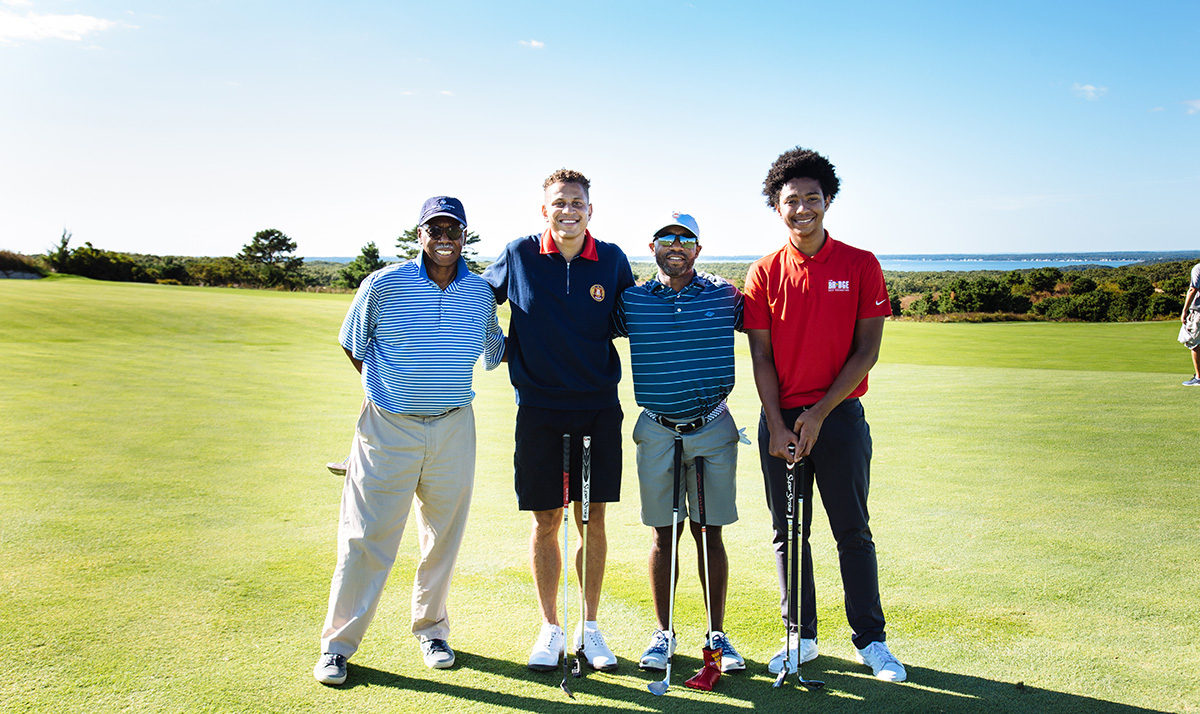
John Fizer with Foundation student Dameul McGill during our fundraising outing at The Bridge on Sept. 23.
John Fizer, an associate at Goldman Sachs who played college golf at Virginia and is a member of The Bridge Golf Foundation’s advisory board, works on his game at The Bridge Golf Learning Center in Harlem. He recently fielded some questions from Executive Director and Co-Founder Farrell Evans.
FE: How did you learn the game?
JF: It was quite accidental, really. My family was on a vacation and my Dad decided to get a lesson, so I tagged along. It stuck with both of us, and from that point on, we were hooked. I play to a 0.6 now and my Dad, who is 74, plays to an 18.
FE: At our recent charity event at The Bridge, you played with your father, John Fizer, Sr., a dentist in Trenton, NJ. How important has golf been to your relationship with your dad?
JF: Golf is our common passion. We learned the game together at the same time, traveled to tournaments together, and continue to play together. Growing up, I remember spending hours driving to junior tournaments with him. Ten hours in the car driving from Jersey to North Carolina is a great way to get to know anyone. And I feel fortunate to have had that time with my dad to really get to know him as a person and not just as my father.
FE: What attracted you to The Bridge Golf Foundation?
JF: I wholeheartedly believe in the mission. Golf creates opportunities. I can personally appreciate what you and Bob (Rubin) are doing to change life outcomes for young men of color. When I think about my life, from junior golf to current, I can’t deny the opportunities that I’ve been afforded because of either my golf abilities, the people I’ve met through golf, or the life lessons that I learned from golf.
FE: You work with Brian Hwang, one of our teaching professionals. Talk about the progress you’ve made with Brian and taking lessons with TrackMan technology.
JF: Over the last few seasons, my golf swing has changed. TrackMan translates the subjective feeling of my golf swing into objective data. Brian is a great young teacher who is able to recognize the changes in my swing and use the TrackMan data to make adjustments. Honestly, I’m hitting it longer and straighter than I did in college. Part of that is due to the equipment, but another part is due to my work with Brian on TrackMan.
FE: You played on the golf team at the University of Virginia. What was that experience like?
JF: Playing in college strengthened my work ethic. Trying to balance athletics and academics as an adolescent/young man required a lot of maturity and discipline. Also, it was not lost on me that I was one of very few black golfers in the ACC and at programs nationwide. There was a sense of responsibility that I felt to work hard to be a positive example. Still one of my prouder moments was being chosen as captain of the golf team my fourth year.
FE: Before going to law school and then Wall Street, you turned pro and worked in the golf industry. What were some of the different jobs you held in the industry?
JF: Playing professional golf is expensive, so I held a number of jobs to cover the cost of traveling and playing in tournaments. I did everything from valet cars at a golf club to picking the driving range to providing private instruction.
Toward the end of my playing career, I took an internship with the PGA Tour that led to a marketing role at Titleist. I worked there for close to two years, traveling the country doing marketing events for Titleist golf balls. I met some great people at the PGA Tour and at Titleist.
FE: Why did you ultimately decide to end your pursuit of a career in golf?
JF: Did I mention playing professional golf is expensive!? I had several friends, family members and mentors who supported my golf career, but at the end of the day, like any sport or business, you have to produce. My game was solid but I wasn’t producing the scores I needed to compete.
As I forecasted three to four years ahead, I thought I could either still be playing and hold a job in the golf industry, or I could switch gears and earn a graduate degree. I choose the latter. It’s actually interesting when I think back because the analytical thinking that I developed playing golf helped me decide to step away from golf and try a new career.
FE: What are your goals now as a player?
JF: Qualifying for the U.S. Amateur and U.S. Mid-Am are goals every year. This area has a lot of great amateur golfers, so playing well in the MGA, NYSGA and NJSGA events are goals also. Mentally, I feel like I am more disciplined and a much better player now than I was in college. Now, it’s about finding the time to work on my swing and play. I feel like my best golf is ahead of me, so we’ll see how I perform the next couple of summers.
FE: What was the last book you read and why?
JF: I just finished “The Way of the Seal” by Mark Divine, a retired Navy Seal commander. It ties back to building mental focus and clarity. I am not saying that golf or finance is like being a Navy Seal, but there are a lot of good takeaways around work ethic, discipline and leadership.
FE: What golf course is on your bucket list to play and why?
JF: For obvious reasons: Pebble Beach with my Dad.
